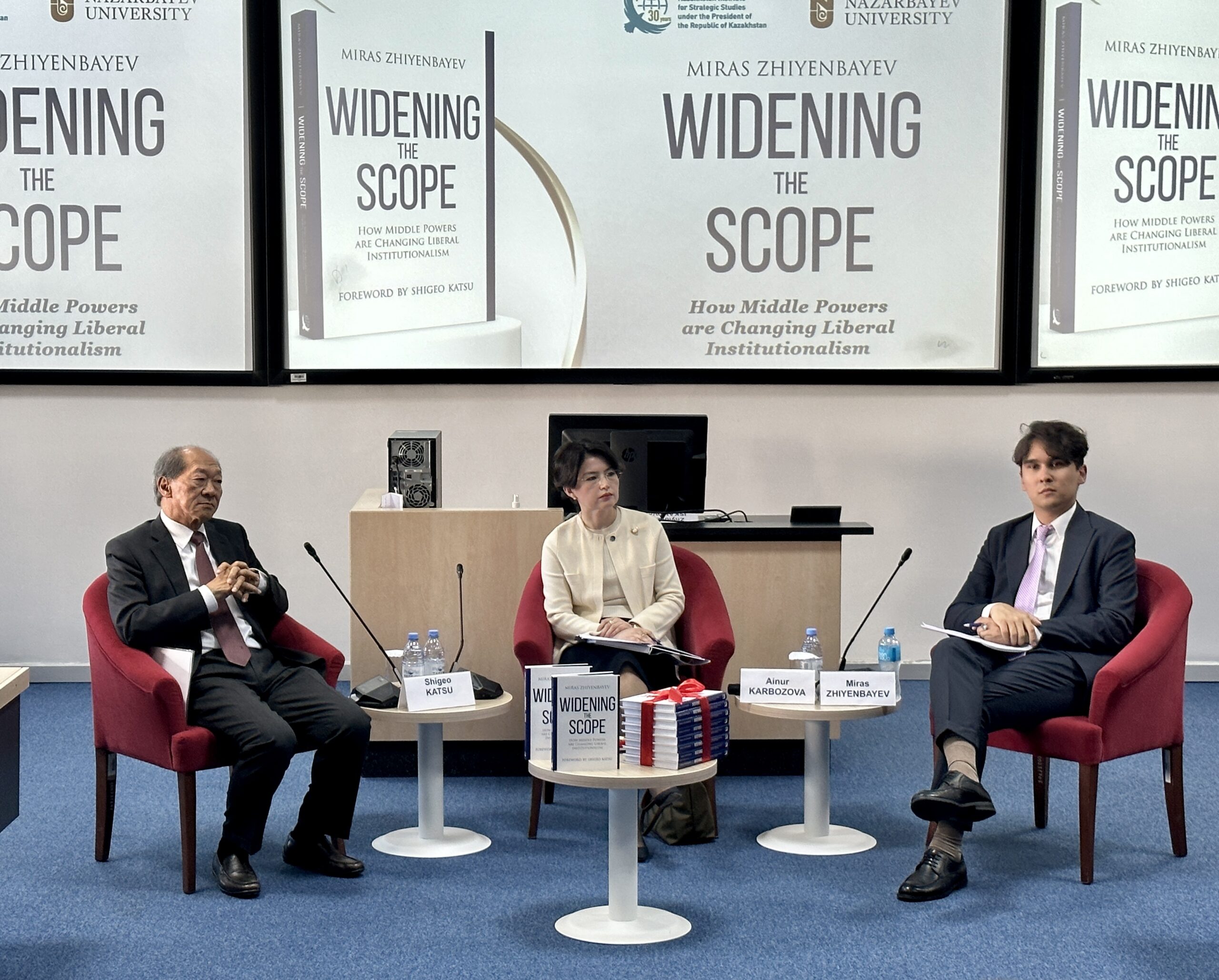ASTANA – Miras Zhiyenbayev, a leading expert of the Kazakhstan Institute for Strategic Studies (KazISS), has presented his book “Widening the Scope: How Middle Powers are Changing Liberal Institutionalism,” which was included in the catalog of novelties of the United Nations (UN) Archives and Library on Sept. 26 in Astana.

From left to right: Former World Bank vice president Shigeo Katsu, Maqsut Narikbayev University Deputy Chairman Ainur Karbozova and the author Miras Zhiyenbayev. Photo credit: The Astana Times.
Zhiyenbayev is a specialist in international relations and political economy with research interests in the theory of international relations, Kazakhstan’s foreign policy and comparative democratization. He became the youngest author to be included in the UN Archives and Library.
The foreword to the book was written by Shigeo Katsu, former World Bank Vice President for Europe and Central Asia and founding president of Nazarbayev University, who attended the presentation and participated in the ribbon-cutting ceremony.
“The fate of our planet is too important to leave it in the hands of just two or so countries, as powerful as they may be. Miras Zhiyenbayev offers a compelling narrative for middle power democracies: they have agency. Their leadership roles in a post-U.S. hegemony world will be ever more important, a proposition that is both timely and provocative,” wrote Katsu in a foreword.
Middle power diplomacy
Zhiyenbayev described his book as an “examination of the shaping role of middle powers in the evolution of international institutions.”
“Middle powers, caught between the ambitions of smaller nations and the hegemony of the great powers, often serve as brokers and bridge builders. They aim to negotiate and balance power and interests, but their ability to do so is often limited by the dominance of the major powers, and despite their potential collaborative endeavors, appears insufficient in proposing alternatives to the prevailing dynamics of great power politics,” said Zhiyenbayev during the book presentation.
Middle powers do not necessarily shift the dynamics of great power politics but rather enhance and complement it.
Yet, the emergence of these new players challenges the existing order of large international institutions such as the UN and the International Monetary Fund (IMF), and foreshadows possible expansion of the international relations horizons, according to the author.
“Engaging in multilateral diplomacy allows middle powers to magnify their voice on the global stage. Their strategies commonly encompass coalition-building, norm entrepreneurship and acting as mediators between the more dominant states. However, these efforts by middle powers to exert external influence often encounter resistance from great powers. These dominant nations, driven by interests that often diverge from those of the middle powers, tend to resist systemic alterations,” Zhiyenbayev said.
The middle power partnerships have greater potential to alter the balance of power.
“Middle powers, by their very nature, cannot dominate the global stage individually. Thus, there is an inherent understanding that there is safety in numbers. Their collective weight can act as a counterbalance, not necessarily against overtly hostile forces but also against the overbearing influence of their more powerful allies,” said Zhiyenbayev.
Zhiyenbayev suggested that middle powers, while favoring multilateralism, also find it crucial to preserve a level of autonomy.
“This independence is paramount for middle powers to act credibly in roles that require impartiality, such as mediation. In essence, while they play a supportive role in the global order, middle powers also ensure they retain enough agency to influence, mediate, and sometimes challenge the very order they help sustain,” he said.
Middle power groupings
In the context of international cooperation arising from middle powers, groupings such as G20, MIKTA (Mexico, Indonesia, South Korea, Türkiye, and Australia) forum, and Association of Southeast Asian Nations (ASEAN) emerge as promising examples of alternative governance models.
The G20, for instance, is a multilateral institution that leaves room for conformity and influence, according to Zhiyenbayev.
“The G20, while fundamentally a cooperative entity, also serves as a stage for power negotiations. Representatives are primarily driven by the pursuit of securing the best possible outcomes for their countries, echoing the realist perspective on international relations. This intricate dance of conformity and influence highlights the complex interplay of power and interests within the G20,” he said.
The G20 is different from the G7 in that it encompasses a broader spectrum of opinions and interests from its member states.
“This inclusivity lends the G20 a unique dynamism in addressing global challenges. The G20 guides the trajectory of global governance by prescribing and reviewing mandates for international institutions such as the IMF. However, it also tactically maintains a strategic distance from these entities,” said Zhiyenbayev.
The book is accessible through this link.

